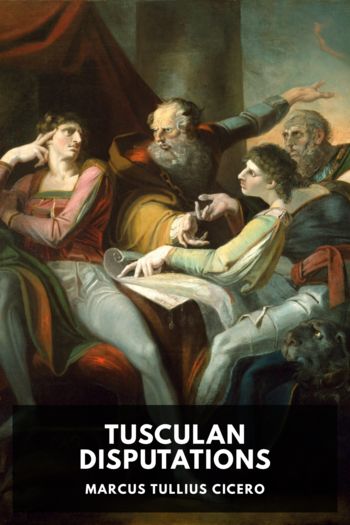Tusculan Disputations, Cicero [good book recommendations TXT] 📗

- Author: Cicero
Book online «Tusculan Disputations, Cicero [good book recommendations TXT] 📗». Author Cicero
Nor is that consolation much to be relied on, though it is frequently practiced and sometimes has some effect, namely, “That you are not alone in this.” It has its effect, as I said, but not always, nor with every person, for some reject it; but much depends on the application of it, for you ought rather to show, not how men in general have been affected with such evils, but how men of sense have borne them. As to Chrysippus’s method, it is certainly founded in truth, but it is difficult to apply it in time of distress. It is a work of no small difficulty to persuade a person in affliction that he grieves merely because he thinks it right so to do. Certainly, then, as in pleadings we do not state all cases alike (if I may adopt the language of lawyers for a moment), but adapt what we have to say to the time to the nature of the subject under debate, and to the person; so too, in alleviating grief, regard should be had to what kind of cure the party to be comforted can admit of. But, somehow or other, we have rambled from what you originally proposed. For your question was concerning a wise man, with whom nothing can have the appearance of evil that is not dishonorable; or at least, anything else would seem so small an evil that by his wisdom he would so overmatch it as to make it wholly disappear; and such a man makes no addition to his grief through opinion, and never conceives it right to torment himself above measure, nor to wear himself out with grief, which is the meanest thing imaginable. Reason, however, it seems, has demonstrated (though it was not directly our object at the moment to inquire whether anything can be called an evil except what is base) that it is in our power to discern that all the evil which there is in affliction has nothing natural in it, but is contracted by our own voluntary judgment of it, and the error of opinion.
But the kind of affliction of which I have treated is that which is the greatest, in order that when we have once got rid of that, it may appear a business of less consequence to look after remedies for the others. For there are certain things which are usually said about poverty, and also certain statements ordinarily applied to retired and undistinguished life. There are particular treatises on banishment, on the ruin of one’s country, on slavery, on weakness, on blindness, and on every incident that can come under the name of an evil. The Greeks divide these into different treatises and distinct books; but they do it for the sake of employment: not but that all such discussions are full of entertainment. And yet, as physicians, in curing the whole body, attend to even the most insignificant part of the body which is at all disordered, so does philosophy act, after it has removed grief in general. Still, if any other deficiency exists—should poverty bite, should ignominy sting, should banishment bring a dark cloud over us, or should any of those things which I have just mentioned appear, there is for each its appropriate consolation, which you shall hear whenever you please. But we must have recourse again to the same original principle, that a wise man is free from all sorrow, because it is vain, because it answers no purpose, because it is not founded in nature but on opinion and prejudice, and is engendered by a kind of invitation to grieve when once men have imagined that it is their duty to do so. When, then, we have subtracted what is altogether voluntary, that mournful uneasiness will be removed—yet some little anxiety, some slight pricking, will still remain. They may indeed call this natural, provided they give it not that horrid, solemn, melancholy name of grief, which can by no means consist with wisdom. But how various and how bitter are the roots of grief! Whatever they are, I propose, after having felled the trunk, to destroy them all, even, if it should be necessary, by allotting a separate dissertation to each, for I have leisure enough to do so, whatever time it may take up. But the principle of every uneasiness is the same, though they





Comments (0)